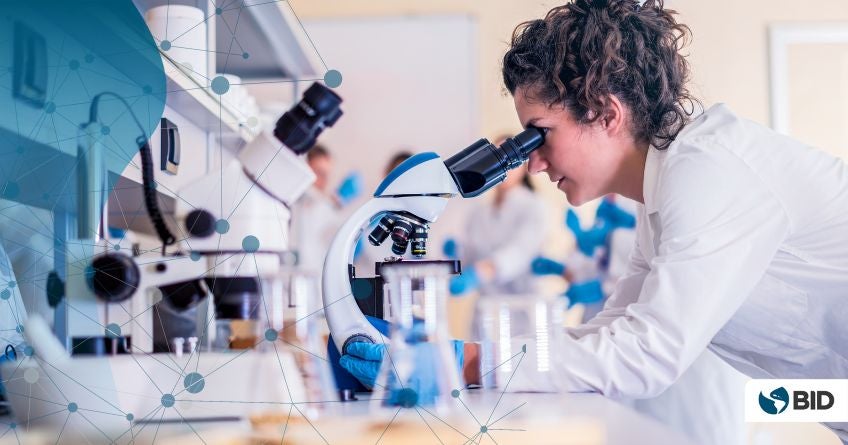Many emerging economies have dedicated programs in which their students, typically at advanced education levels, go abroad for (part of) their studies. The rationale is that some of those students will return home and bring with them new knowledge.
But what about the many scientists who are not mobile but who study, teach, and do research in their own country? Do they have access to this wider variety of knowledge inputs through their internationally mobile colleagues?
In our latest publication, Connecting the Dots: The Role of Internationally Mobile Scientists in Linking Nonmobile with Foreign Scientists, we answer this question through an investigation of the role played by mobile Brazilian and Colombian scientists in connecting nonmobile scientists with foreign scientists. More precisely we ask whether, after publishing co-authored papers with internationally mobile scientists, a non-mobile scientist is more likely to publish with a foreigner than they were before the co-publication, and compared to non-mobile colleagues who do not publish with mobile scientists.
What is new about this study? Unlike most studies that discuss the effects of international mobility on mobile scientists, we study what they bring back home, and particularly whether it is shared with local colleagues. We differentiate among three types of mobile scientists: the diaspora, who have never worked in a research organisation in their home country; returnees, who have never worked in a research organisation broad; and the intermittent who have worked in research organisations both abroad and in their home country for at least one year.
The short answer to our question is yes: internationally mobile scientists, those who go abroad for their PhDs or to work, help connect non-mobile scientists with foreigners. There is a longer answer, which includes important qualifications.
To address this question we combined data from several sources: Lattes, which is Brazilian administrative data, containing Curriculum Vitae for active research scientists in Brazil; CVLaC, a similar database for Colombia; PhD scholarship repositories in Brazil and Colombia; and OpenAlex, a publicly available repository of scientific publications, including, when available, bibliographic details of authors, citations of papers and other metadata.
As with any scientometric work, much effort is put into correctly identifying scientists and then matching them across the different databases. Ultimately we were confident in identifying about 20,000 Colombian and 100,000 Brazilian scientists in creating the datasets we used, around 70% of active scientists in academia in both countries. A challenge in both cases was identifying the diaspora. Some could be identified because their Lattes or CVLaC data are up to date; some could be identified using affiliation records drawn from OpenAlex combined with name and publication patterns. But certainly, we are missing several, particularly in the Brazilian case. So if there is a positive effect of the diaspora on the home knowledge systems, we are underestimating its magnitude.
To identify the impact of coauthoring with a mobile scientists on the probability that nonmobile scientists coauthor with foreign scientist, we used an event study. The “event” (or “treatment”) for the nonmobile scientist is a co-authored publication with a mobile scientist. We compare the group of nonmobile scientists who are subject to at least one such event with the group of those who are not. We show that before the collaboration, these two groups had no difference in co-authoring with foreign scientists. But is there a difference after collaborating with a mobile scientist? The methodological challenge here is that any individual might be subject to more than one “event”. We dealt with this by sampling the data by the number of distinct mobile scientists with whom the non-mobile collaborated.
When we consider any number of unique mobile scientists, collaborating with them has a positive and lasting effect on the number of publications with foreign co-authors that a nonmobile scientist writes. That number jumps in the year of the interaction by 20 to 30%, is less positive in the second year, but then grows for at least the next 5 years. The growth over time might well be driven by repeated collaborations with a mobile scientist, who involves a foreign scientist. In fact, for non-mobile scientists who collaborate with exactly one or two mobile scientists the large positive effect contemporaneous with the event immediately fades away in the following years.
Differences are found among mobile scientists in the case of Brazil: intermittent, and diaspora scientists drive the long-term positive effect of collaborating with multiple mobile scientists, whereas returnees have a much smaller impact.
Can we identify the mechanism? One can never be certain, but when we eliminate from our data publications involving a mobile scientist, treated and untreated scientists show no difference in propensity to collaborate with foreigners. What this suggests (or perhaps implies) is that continued interaction with mobile scientists is necessary for a non-mobile scientist to effect foreign collaborations.
In sum, sending students to do their PhDs, and scientists to work abroad can have a substantial impact on connecting local science systems to global knowledge production. However, these mobile scientists must act as gatekeepers, coauthoring with both the nonmobile and the foreign scientists. This implies, consistent with other studies, that fostering local collaborations is necessary for the value of foreign sojourns to be realized domestically.
In future research, it is important to identify the mechanisms that generate these results and examine their impacts on nonmobile scientists. Additionally, research should be conducted to understand if these connections lead to more knowledge creation, which contribute to the challenges of their countries of origin. These and more questions can be answered with the data we have put together in this study.


Leave a Reply